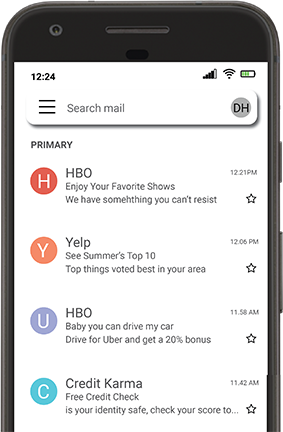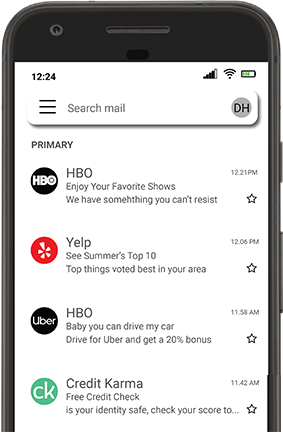SSL Certificate
Deploy an SSL certificate to enable HTTPS encryption of websites, trusted identity authentication and prevent against data leaks or tampering during transmission.
Get SSL Certificate >Issued within 3-7 days Validates organization, trademark, sender identity Displays verified logos in email inbox Supported in Gmail and Yahoo
Logo-verified email with VMC is part of a groundbreaking initiative by Brand Indicators for Message Identification (BIMI) in cooperation with email client providers (Gmail), aimed at providing companies and customers with a consistent, trusted and verifiable email experience. Here’s how it works.
A VMC is the only way to display brand logo on verified emails.
Before you can display your logo, email clients must be able to validate that the company is enforcing DMARC standards, which can render your company more control over emails so as to reduce phishing and spoofing attacks.
The trademarked logo can be uploaded and displayed in email clients after DMARC enforcement. If you have multiple logos, you can choose the corresponding logo for each communication flow.
Emails without VMC
Recipients only see default initials

Emails with VMC
Recipients see verified brand logos

Use VMC to display company logo directly next to each email message, boosting your brand image.
VMC provides a consistent, trusted and verifiable email experience to customers who are usually more willing to trust and work with enterprises that value email security.
VMC helps to make your emails stand out in customer inboxes and increase open rates, recall and the likelihood of purchase.
By complying with DMARC, it shows that your company follows the highest level of email security practice, making it harder for cybercriminals to target your customers with identity-focused attacks like spoofing and phishing.
Using VMC and enforcing DMARC can help you get better visibility and control over the emails sent and received by your domain, and gain clear insight into the types and frequency of attacks targeting your domain.
Complying with DMARC means your emails won't be easily marked as spams because recipients can see your verified logo directly which ensures the authenticity and legitimacy of the email source. It also allows customers to associate trust with your email communication and spikes email open rates and engagement.
Before you can qualify for a VMC, your organization needs to meet the following requirements to validate the domain and brand identity.

Implement DMARC standards

Trademark your logo

Convert your logo file to the .SVG format

Purchase a VMC

Install your VMC
FAQs on SSL Certificates
According to DMARC. org: DMARC, which stands for Domain-based Message Authentication, Reporting & Conformance, is an email authentication, policy and reporting protocol. It builds on the widely deployed SPF and DKIM protocols, adding linkage to the author (“From:”) domain name, published policies for recipient handling of authentication failures, and reporting from receivers to senders, to improve and monitor protection of the domain from fraudulent email.
In short, DMARC provides security professionals with greater transparency and greater control over the emails sent and received by their domains, as well as the ability to identify, prevent or block potentially fraudulent emails. DMARC helps protect customers and brands from phishing and spoofing attacks.
BIMI, which stands for Brand Indicators for Message Identification, is an email standard that strengthens sender authentication and enables email inboxes to display the trademarked logo. VMC validates that the trademarked logo belongs to your legitimate organization. A VMC needs to be associated with a BIMI record as a tamper-resistant security measure.
A VMC guarantees the authenticity of your brand and logo working alongside BIMI and DMARC, and improves email trust. After your organization implements DMARC, the VMC can enable email clients to display brand logos directly to prevent business impersonation.
You can apply for a VMC from DigiCert or Entrust if your logo has been registered as a trademark. After you have obtained a VMC, you’ll receive a file containing a PEM-encoded certificate chain. Please place the logo file (.SVG format) and the certificate (PEM file) to publicly accessible https server, make a note of their path and paste the URL into the BIMI record.
S/MIME certificates provide digital signatures and email encryption that can ensure the authenticity, non-repudiation, integrity and confidentiality of emails, effectively preventing against email tampering and phishing attacks.
Currently BIMI is supported by a few email providers - Gmail, Fastmail, Yahoo Mail, AOL, Netscape and Apple Mail.